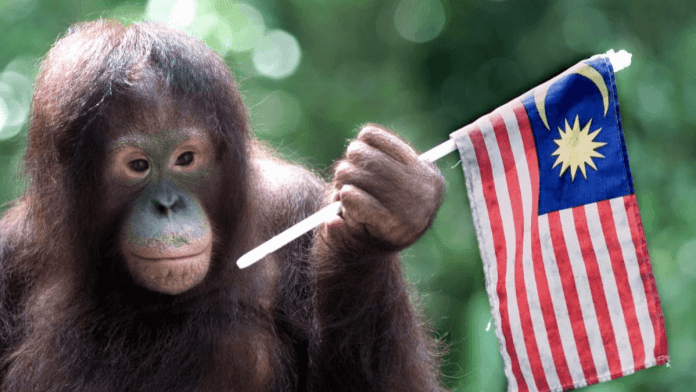News in Brief:
– Malaysia plans “Orangutan Diplomacy” measure to counter palm oil criticism, gifting great apes to key trading partners like the EU, India, and China.
– Amidst EU regulations and global deforestation concerns, Malaysia seeks to balance economic interests with conservation efforts, using orangutans as diplomatic symbols.
Malaysia is currently planning to gift orangutans to key trading partners in an effort to alleviate concerns over deforestation caused by its palm oil industry. The initiative comes amid the implementation of a new EU regulation mandating proof of sustainable palm oil practices.
Commodities Minister Johari Abdul Ghani unveiled the “orangutan diplomacy” strategy at a forum on biodiversity. The plan aims to demonstrate Malaysia’s commitment to sustainable palm oil production and environmental conservation, particularly to major importers like the EU, India, and China.
Palm oil industry under scrutiny
With Malaysia and Indonesia jointly accounting for 85% of global palm oil production, the industry is a vital economic contributor. However, rampant accusations of deforestation, including destruction of orangutan habitats, has drawn international criticism. Malaysia has until the end of 2024 to comply with the EU’s deforestation regulation, adding urgency to its diplomatic efforts.
Local farmers, heavily reliant on palm oil cultivation, stand at the forefront of this issue. The sector, valued at over $7.5 billion, faces pressure to adopt sustainable practices while navigating fluctuating market prices. Figures show a decline in crude palm oil prices in recent years, impacting the income of smallholder farmers.
Emulating China’s panda diplomacy
Orangutans, classified as critically endangered, symbolise the environmental toll of palm oil production. Habitat loss due to deforestation threatens their survival, with thousands killed annually. Malaysia’s orangutan diplomacy seeks to address conservation concerns while preserving its economic interests.
Drawing inspiration from China’s panda diplomacy, Malaysia aims to leverage its wildlife assets for diplomatic goodwill. Just as Malaysia received pandas from China in 2014, it now seeks to use orangutans as ambassadors of conservation.
As Malaysia navigates the complexities of sustainable palm oil production and international regulations, its orangutan diplomacy represents a novel approach to address environmental and economic challenges. With global attention on deforestation and wildlife conservation, the success of this initiative could shape Malaysia’s role in the international community.



